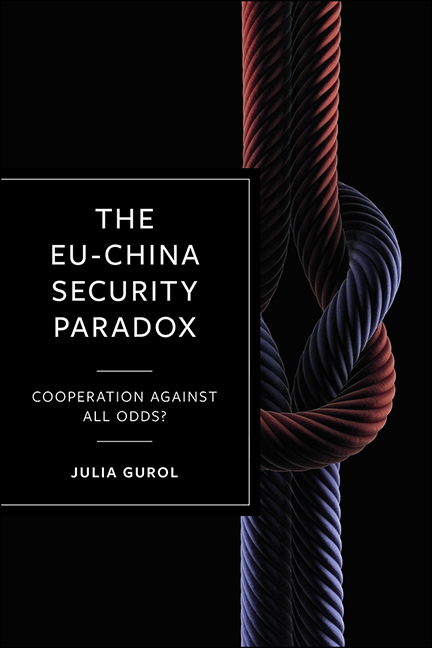Book contents
- Frontmatter
- Contents
- List of Figures
- List of Tables
- List of Abbreviations
- About the Author
- Acknowledgements
- 1 The EU and China in a Changing International Environment
- 2 Analytical Framework: Towards Multidimensionality
- 3 The EU’s and China’s Foreign and Security Policy Principles
- 4 The EU and China on the Global Stage: Interests and Interdependence
- 5 Framing and Perceptions in EU–China Security Relations
- 6 EU–China Relations on Anti-Terrorism
- 7 EU–China Relations on Maritime Security and Anti-Piracy
- 8 EU–China Relations on Climate and Energy Security
- 9 The US: An Elephant in the Room for EU–China Security Relations
- 10 Conclusion and Outlook: The EU and China at a Crossroads
- Notes
- References
- Index
4 - The EU and China on the Global Stage: Interests and Interdependence
Published online by Cambridge University Press: 15 September 2022
- Frontmatter
- Contents
- List of Figures
- List of Tables
- List of Abbreviations
- About the Author
- Acknowledgements
- 1 The EU and China in a Changing International Environment
- 2 Analytical Framework: Towards Multidimensionality
- 3 The EU’s and China’s Foreign and Security Policy Principles
- 4 The EU and China on the Global Stage: Interests and Interdependence
- 5 Framing and Perceptions in EU–China Security Relations
- 6 EU–China Relations on Anti-Terrorism
- 7 EU–China Relations on Maritime Security and Anti-Piracy
- 8 EU–China Relations on Climate and Energy Security
- 9 The US: An Elephant in the Room for EU–China Security Relations
- 10 Conclusion and Outlook: The EU and China at a Crossroads
- Notes
- References
- Index
Summary
Introduction
The EU and China are, although relative newcomers to global governance, two of the most important and influential global actors. In particular, during the four years of the Trump administration and its rather protectionist and isolationist foreign policy, attention has turned towards the EU and China when it comes to issues of global governance. They do not only possess the economic strength to affect global governance (Christiansen et al, 2019), but are also decisive rule-makers on the international stage. While both the EU and China are still struggling to find their rightful place on this stage, they are already central driving forces of globalization and have become increasingly entangled in international politics and the international economy.
The question of whether this leads to increased cooperation or whether it deepens competition and rivalries divides the scholarly debate on the subject. Some observers hold that China's rule-making ambitions will unavoidably lead to deepening tensions based on the fact that China actively challenges existing rules, norms and procedures – and thereby in the end also the ‘liberal script’ of the current world order (Huotari and Drinhausen, 2020; Meinhardt, 2020). A frequently mentioned argument from this school of thought is that China might use its economic leverage to exert political power and create international rules and even institutions that are more in line with its own identity and interests (Geeraerts, 2011; Legarda, 2020). Critics argue that China, as one of the driving forces of current world politics, is so deeply entangled with other economies and political powers, and so reliant on integration into the international system, that it inevitably needs to seek more cooperation (see, for example, van der Putten and Chu, 2012). This assumption dates back to the ‘convergence myth’ (see Chapter 1) and reflects the integral principles of liberal-institutionalist thinking.
This chapter examines whether, how and under which conditions the increasing global entanglement of the EU and China actually translates into security cooperation. It takes a temporal perspective to include the changing dynamics and geopolitical developments that surround the EU and China, presuming that in a globalized world, no actor's behaviour can be understood without embedding it in a larger context. The chapter proceeds in three steps.
- Type
- Chapter
- Information
- The EU-China Security ParadoxCooperation against All Odds?, pp. 49 - 60Publisher: Bristol University PressPrint publication year: 2022



